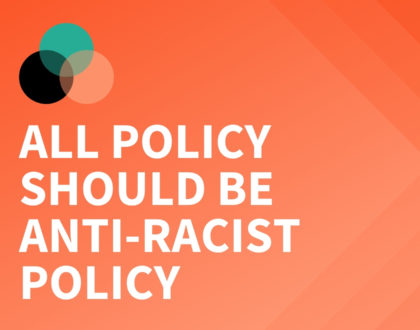Stand Against Racism Month: All policy should be anti-racist policy

Each April, YWCAs across the country take action as a part of the Stand Against Racism campaign. We encourage our community to intentionally take time to learn, discuss, and reflect on the ways in which racism is embedded in our relationships, communities, and systems and how to resist oppression in all forms. This includes our public policy efforts.
The first step towards anti-racist public policy is to acknowledge how policies have historically discriminated against communities of color. Without a thorough understanding of the past we cannot think about moving into a more equitable future. As the Center for Study in Social Policy highlights “white supremacy thrives on ahistorical thinking.” Any new policies that do not recognize historic harm in their creation will only cause additional harm in their implementation. Anti-racist policies have a clear understanding of the policies and activism that came before them.
Many policies that may appear race neutral at the outset actually have deep historic roots in racist thought or disparate racial outcomes. Transit policies are an example of the ways in which supposedly race blind policies have had historically negative outcomes for communities of color. Professor of Urban Planning and Development at Texas Southern University Robert Bullard researches the history of transit policy and documents how it benefits rich White communities at the expense of poor communities of color, a phenomenon he calls “highway robbery.” “You can’t wash race out of it” says Bullard, “There’s all kinds of studies that show that race is still the most potent variable for predicting who gets more than their fair share of the ‘nasty stuff,’ and who gets more than their fair share of the good stuff.” The “nasty stuff” he is referring to includes exposure to pollution from nearby highways or flooding due to crumbling sewer infrastructure or heat islands that arise when there is no green space for miles — each of which shortens the lives of people of color who live nearby. The policies that created these outcomes were supposedly created to value access and prosperity. However, it turned out that their benefits were for some, not all.
We must recognize how our own policies in Boston have perpetuated systemic racism.
Boston has its own stories of transit policies that harm communities of color. Just one example is the Southwest Corridor Park that runs through the South End and Roxbury, the remnant of a planned highway from the mid-20th century that was stopped by the tireless work of community advocates, but not before hundreds of homes owned predominantly by Black Bostonians were destroyed to make room. Even today there is clear delineation in the different parts of the park that have or haven’t been historically invested in, with the predominantly Black sections of the corridor having significantly lower quality public space with things like trains clattering above ground and a lack of protected green and walking space.
Access to public transportation is also clearly divided among racial lines in Boston. Many of Boston’s communities of color, particularly those with large Black and immigrant populations, have the longest commutes to work due to a lack of accessible public transportation. Mattapan residents, which is 82% Black, have the longest commutes, as they are the least likely to have an under-30-minute commute and the most likely to commute for over an hour. So, when the MBTA began to reduce service as a result of the COVID-19 pandemic, critics argued that policy makers and the MBTA must take an anti-racist approach. Workers from communities are color have been the most likely to be considered essential, and therefore have relied on MBTA services throughout the pandemic. As Congresswoman Ayanna Pressley stated, “In a three-mile radius from Cambridge to Roxbury, life expectancy drops by thirty years and median household income by fifty thousand dollars. A lack of access to affordable, rapid, reliable transit has contributed and created that. This is not naturally occurring. So transit justice is a racial justice issue. It is also a workers’ rights and economic justice issue.”
A seemingly race blind policy like transit has well documented negative impacts on communities of color in Boston and across the nation. The same could be said for environmental policy, housing policy, education policy, tax policy, childcare policy, and the list goes on. Anti-racist policy making isn’t about what area the policy is in, but how the policy is being thought about and implemented. The place to start in this analysis is in the past. Ahistorical thinking is what allows racist policies to persist and ignores historic systemic inequities that much of our public policy has produced over the centuries. Moving forward, we must approach all public policy with an anti-racist lens to work towards equity for all.
Interested in taking action to promote anti-racist legislation in Massachusetts? Sign up for YW Boston’s Advocacy Newsletter:
______
About YW Boston
As the first YWCA in the nation, YW Boston has been at the forefront of advancing equity for over 150 years. Through our DE&I services—InclusionBoston and LeadBoston—as well as our advocacy work and F.Y.R.E. Initiative, we help individuals and organizations change policies, practices, attitudes, and behaviors with a goal of creating more inclusive environments where women, people of color, and especially women of color can succeed.
YW Boston Advocacy Committee
The Advocacy Committee supports YW Boston’s mission to eliminate racism and empower women by engaging elected officials, organizations and the public through legislative advocacy, coalition building, education, and action. The committee develops and implements the organization’s two-year advocacy agenda in order to rectify structural barriers to equity and opportunity for women, girls, and people of color.
